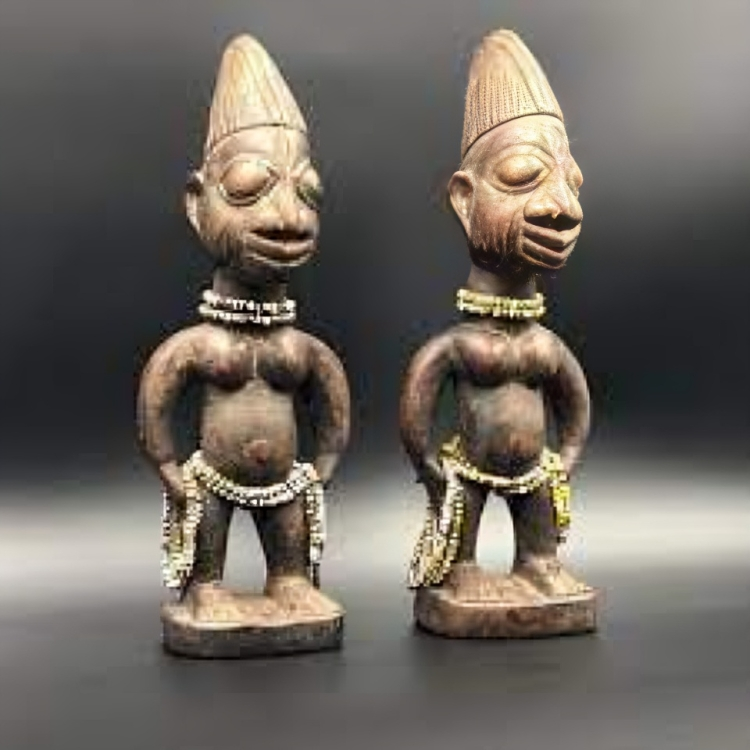Nichée dans l'État d'Oyo, au Nigéria, Igbo-Ora est une ville unique en son genre. Réputée pour son taux exceptionnellement élevé de naissances gémellaires, Igbo-Ora s'est vu attribuer le titre de « Capitale mondiale des jumeaux ». Alors que la moyenne mondiale se situe autour de 12 naissances gémellaires pour 1 000 naissances, Igbo-Ora affiche un taux stupéfiant de près de 50 pour 1 000. Mais qu'est-ce qui rend ce phénomène si unique, et comment s'inscrit-il dans la culture et l'histoire du peuple Yoruba ?
Signification culturelle des jumeaux dans la société yoruba
Dans la culture yoruba, les jumeaux, appelés « Ibeji », sont considérés comme porteurs de bonne fortune et occupent une place vénérée au sein de la communauté. La tradition yoruba de nommer les jumeaux reflète une croyance profonde : • Taiwo : « Le premier à découvrir le monde. » • Kehinde : « Celui qui vient après. » On croit que Kehinde, l’aîné spirituel, envoie Taiwo explorer le monde. Les jumeaux sont souvent vêtus de tenues identiques et leur naissance est célébrée par de grandes cérémonies. Ils sont considérés comme des êtres spirituels capables d’apporter la prospérité à leurs familles, ce qui renforce leur importance dans la société yoruba.
Théories expliquant le taux élevé de naissances gémellaires chez les Igbo-Ora
1. Facteurs alimentaires : Une théorie locale répandue attribue le taux élevé de naissances gémellaires à une spécialité traditionnelle : la soupe de feuilles de gombo appelée ilasa. Souvent servie avec de la farine d’igname (amala), cette soupe est réputée contenir des composés naturels qui stimulent les ovaires, augmentant ainsi les chances de libération de plusieurs ovules lors de l’ovulation. 2. Facteurs génétiques : L’ethnie Yoruba, prédominante à Igbo-Ora, est connue pour sa prédisposition génétique aux grossesses multiples, notamment aux jumeaux dizygotes. Ce trait héréditaire pourrait expliquer la forte prévalence des grossesses gémellaires dans cette région.
Contexte historique
La perception des jumeaux a évolué au sein des différents groupes ethniques du Nigeria. Chez les Yorubas, les jumeaux ont toujours été célébrés et honorés. En revanche, d'autres groupes ethniques, comme les Efik, les considéraient historiquement comme un mauvais présage. Cela a conduit à des pratiques tragiques telles que l'infanticide des jumeaux. Mary Slessor, une missionnaire écossaise, a joué un rôle déterminant dans l'abolition de ces pratiques chez les Efik à la fin du XIXe siècle.
Le festival des jumeaux
Pour célébrer son patrimoine unique, Igbo-Ora organise chaque année le Festival des Jumeaux. Cet événement haut en couleur attire des milliers de jumeaux du monde entier et propose des spectacles culturels, des défilés et la présentation de costumes traditionnels yoruba. Le festival témoigne de la fierté de la communauté pour son riche patrimoine et renforce les liens entre les participants.
Conclusion
Le phénomène extraordinaire de gémellité d'Igbo-Ora est le fruit d'une magnifique combinaison de facteurs culturels, génétiques et peut-être aussi alimentaires. Grâce à son festival annuel et à la vénération des jumeaux dans la culture yoruba, la ville a forgé un héritage qui souligne son identité unique. Igbo-Ora témoigne de la beauté de la diversité et de sa célébration, et son histoire mérite d'être partagée avec le monde entier.



